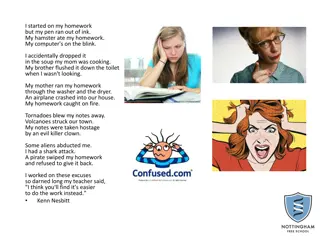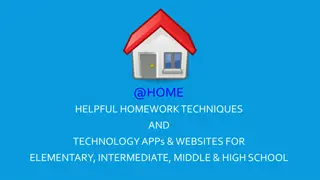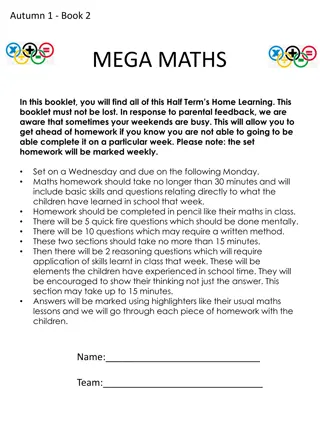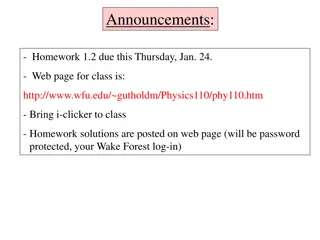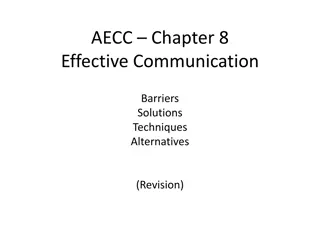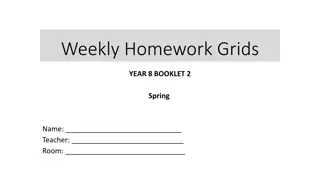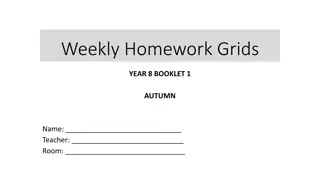Understanding Homework Strategies and Overcoming Challenges
Learn effective homework strategies, understand the purpose of homework better, diagnose common problems like procrastination, and explore solutions to help students succeed. Discover tips for improving executive functioning skills, creating good homework habits, and supporting students facing various challenges in completing their homework assignments.
Download Presentation

Please find below an Image/Link to download the presentation.
The content on the website is provided AS IS for your information and personal use only. It may not be sold, licensed, or shared on other websites without obtaining consent from the author. Download presentation by click this link. If you encounter any issues during the download, it is possible that the publisher has removed the file from their server.
E N D
Presentation Transcript
Homework Strategies By: Alexis Adinolfi and Judy Miller
Agenda Purpose of homework Diagnosing the problem What is Executive Functioning? How does it relate to homework? Executive Functioning homework strategies General homework strategies
Can you relate? Raise your hand if this sounds familiar I did all of my homework, studied for my test, and completed my science lab during lunch. I don t have any homework. Oopps I forgot my Math workbook in school. I think I forgot to write my homework down in my agenda and I don t know what I have to do. We were NEVER taught this, I have no idea what this means Mom, can you come bring me my homework folder, I left it on the kitchen table. THIS IS TOO HARD!!! I M NOT DOING IT! Johnny, get in here now! Look at the parent portal, it says you re failing because you re NOT doing your homework!!!!
Purpose of homework Purpose of homework To check whether the student understands a concept or skill To practice or reinforce a skill already learned in class To preview something they will learn in class To review for a test or quiz Improve / teach Executive Function skills What is good homework? Clear academic purpose (not busy work) Well-organized, easy to understand, not overly tedious The NEA recommends 10-minutes per grade level per night (6thgrade = 60 minutes) All subjects combined Does not include breaks
Diagnosing the problem: Why isnt my child completing their homework? Academic Task too hard or too lengthy for the students working speed Organizational Getting it home, getting it done, getting it back Motivational Burnout, overload, too much failure, frustration with tasks Situational Unable to work at home, too many other activities, no materials available at home Personal Depression, anxiety, family problems or other personal issues Once the reasons for lack of homework completion are specifically diagnosed, then proactive and strategic plans can be put into place to support your student.
Procrastination Procrastination is simply a symptom of other problems. David, a 6thgrader, puts off doing homework because the tasks he is assigned are boring and tedious. Jason a 3rdgrader, has both academic and motivational reasons for procrastinating. He avoids homework because the tasks are so difficult that he feels frustrated and incompetent. Amanda, a 4thgrader, has organizational problems with long-range projects. She has little experience or guidance on how to budget time and set intermittent deadlines for herself. Nathan, an 8thgrader, has situational reasons for procrastinating. He has to make time for sports and a social life, leaving little time for homework.
Strategies to assist in diagnosing the problem Parent or student feedback checklist Can help us determine how much time students are spending on homework and the reasons why homework is not being completed. Home study plan Helps students reflect on the conditions in which they work best. The best time and place to do homework. Taylor s homework chain Helpful for students with organizational issues. Helps students self-diagnose where organization is breaking down in the process of getting homework completed and turned in.
Parent or student feedback checklist Parent Feedback Checklist Dear parent: I estimate your child can complete this assignment in _______minutes. It is not necessary for your child to work longer than____minutes on this assignment, even if they do not finish it. They will not be penalized. How much time did your child spend on this assignment?______________ If your child did not finish the assignment, please check the reason or reasons why below: ____my child could no longer focus on the task ____my child was too tired ____my child did not understand the assignment ____my child did not have the necessary materials to complete the assignment ____my child did not have enough time due to other outside activities ____other reason (please explain) ______________________________________________ parent signature
Home study plan My favorite position to do homework is At a desk, sitting on the floor, standing, laying down It is easiest for me to pay attention to homework In a quiet place, with noise or music in the background When I am working on homework I need to have something to eat or drink, I don t need to have drinks or food When I have more than one thing to do I like to do the easiest thing first, I like to do the hardest thing first After I start working, I like to Work for a long time before I take a break work for a short time, take a break, then work When is it easiest for me to do homework? As soon as I get home from school I need to play for a little and then work I need a long break after school before I am ready to work Where will I do homework?
Diagnosing the problem: Weak links in the homework chain. [ ] Realize an assignment is being given [ ] Understand what the assignment is [ ] Record the assignment accurately [ ] Understand how to do the assignment [ ] Remember to bring the correct books and materials home [ ] Actually arrive home with those materials (don t leave on bus or in desk) [ ] Begin homework and complete in reasonable time [ ] Check homework for completeness, accuracy, and neatness [ ] Ask a parent to review it [ ] Put completed homework in place so that he/she will remember it [ ] Take completed homework to school [ ] Arrive in class with homework (not left in locker, bus, or parents car) [ ] Turn in homework
Executive Function What is executive functioning? Self-regulating skills that we use every day to accomplish just about everything. Organizing, setting priorities, and starting tasks Focusing, shifting or sustain attention and thinking flexibly Regulating alertness and staying on task Managing frustration and keeping emotions in check Using working memory and recalling information Self-monitoring and controlling impulses Homework can teach and improve executive function skills
Homework strategies assist with executive function deficits Checklists to-do lists prioritizing tasks Chunking Break down different kinds of homework assignments with your student to get them used to the steps required and how long they might take. Visual schedules Weekly and monthly calendars with color-coded events Set time limits Assign a time limit for each step on your checklist Use that planner Post teacher websites in a accessible location. Use Rewards! Punishing students into doing homework DOESN T work External motivators (Sticker chart) JSMS School-Wide Positive Behavioral Intervention Supports
Strategies Do It as Early as Possible: Best for Everyone On days when there are no afternoon activities, give your child a time frame say, between 3 p.m. and 5 p.m. to get down to business. This gives some control over her schedule. Create a Call List: Best for Forgetters kids need a list of three or four classmates they can call on when they forget an assignment Build Confidence: Best for the Intimidated When kids don t get something right away, they may feel like they re stupid and start to shut down. You can short-circuit negative thinking by sitting down and figuring out the first problem together. That alone can help him remember how to do the rest. Cut It in Half: Best for the Overwhelmed Change the Scene: Best for Daydreamers Something as simple as a special place to work can boost a child s motivation and, in turn, his confidence. Beat the Clock: Best for Procrastinators Set a timer, give a break Your Way vs. The Teacher s Your child s tearing up over a long-division worksheet and you actually remember how to get the answer. But the teacher s instructions are different. Do you show your kid your method so at least she ll have the correct answer?
Homework Tips for Parents Be a Stage Manager Make sure your child has a quiet, well-lit place to do homework. Make sure the needed materials are available. Remove electronics (phone) and other unnecessary distractions. Be a motivator Be a monitor Look for signs of frustration and failure If your child asks for help, provide guidance, not answers. If frustration sets in, suggest a short break.


